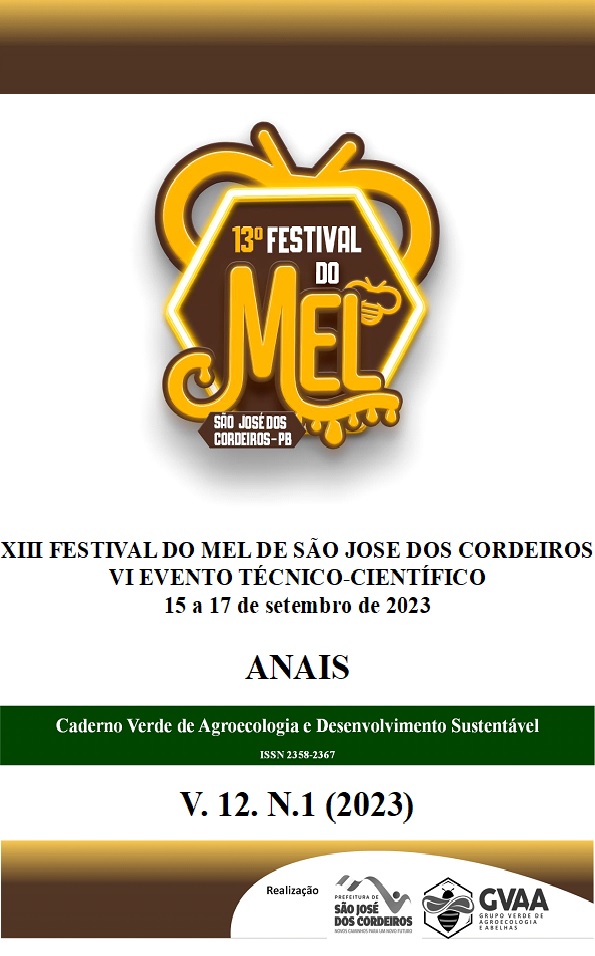A disseminação da atividade apícola e as implicações para a conservação dos polinizadores e os objetivos do desenvolvimento sustentável
Keywords:
Educomunicação, Extensão rural, radio, ApiculturaAbstract
The ecosystem service of pollination contributes enormously to environmental conservation, food security and, consequently, the achievement of the Sustainable Development Goals (SDGs). However, there is still a strong lack of awareness among farmers about the importance of protecting environmental functions in forest management to ensure the conservation of pollinators. The aim of this study was to report on the importance of radio as a rural communication vehicle for disseminating knowledge about beekeeping in the Cariri region of Paraíba, based on the experience of the Matutando Solos e Agroecologia programme, which for over a decade has been talking on the radio on 95 FM in Sumé about soil conservation practices and the potential of the Caatinga biome. Matutando is an innovative university extension programme based at the Centre for Sustainable Development in the Semi-Arid (CDSA), a campus of the Federal University of Campina Grande (UFCG). As of 2018, Matutando's methodological approach included live broadcasting via Facebook, with the main aim of promoting greater proximity and strengthening dialogue with listeners. Through this tool, highly interactive communication scenarios were created, enriching the informative, cognitive and emotional experience, giving listeners greater interaction with the presenters and interviewees. Addressing topics such as beekeeping, the beekeeping ecosystem, soil conservation practices and the potential of the Caatinga biome, throughout 2023 the programme brought farmers and bee breeders to the radio in order to highlight local knowledge and practices, with a focus on the region's productive activities. As well as sharing research of interest to rural people, the programme has also highlighted the richness of bee flora, composting and the formation of seed banks as important strategies for strengthening the sector. The experience of the Matutando programme reflects the importance of radio and rural communication as a powerful vehicle for educommunication and as a public policy proposal to strengthen technical assistance in order to boost rural activities and sustainable rural development in the region.
Downloads
Published
How to Cite
Issue
Section
License
Copyright (c) 2023 Jarlean Lopes, Cleomária Gonçalves da Silva, José Ilton Pereira Alves, Rogerio Andrade Emídio, Robymar da Silva Nascimento, Adriana de Fátima Meira Vital

This work is licensed under a Creative Commons Attribution 4.0 International License.
Termo de cessão de direitos autorias
Esta é uma revista de acesso livre, em que, utiliza o termo de cessão seguindo a lei nº 9.610/1998, que altera, atualiza e consolida a legislação sobre direitos autorais no Brasil.
O(s) autor(es) doravante designado(s) CEDENTE, por meio desta, publica a OBRA no Caderno Verde de Agroecologia e Desenvolvimento Sustentável, representada pelo Grupo Verde de Agroecologia e Abelhas (GVAA), estabelecida na Rua Vicente Alves da Silva, 101, Bairro Petrópolis, Cidade de Pombal, Paraíba, Brasil. Caixa Postal 54 CEP 58840-000 doravante designada CESSIONÁRIA, nas condições descritas a seguir:
O CEDENTE declara que é (são) autor(es) e titular(es) da propriedade dos direitos autorais da OBRA submetida.
O CEDENTE declara que a OBRA não infringe direitos autorais e/ou outros direitos de propriedade de terceiros, que a divulgação de imagens (caso as mesmas existam) foi autorizada e que assume integral responsabilidade moral e/ou patrimonial, pelo seu conteúdo, perante terceiros.
O CEDENTE mantêm os direitos autorais e concedem à revista o direito de divulgação da OBRA, com o trabalho simultaneamente licenciado sob a Licença Creative Commons do tipo atribuição CC-BY.
O CEDENTE têm autorização para distribuição não-exclusiva da versão do trabalho publicada nesta revista.
O CEDENTE têm permissão e são estimulados a publicar e distribuir seu trabalho online (ex.: em repositórios institucionais ou na sua página pessoal) a qualquer ponto antes ou durante o processo editorial, já que isso pode gerar alterações produtivas, bem como aumentar o impacto e a citação do trabalho publicado.








